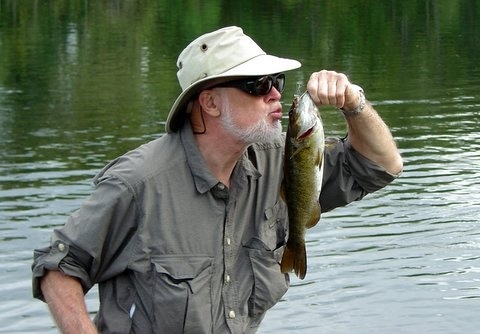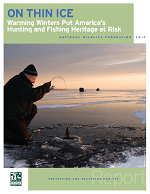We have much more to do and your continued support is needed now more than ever.
A Great Fishery in Dire Straits
Ed Perry is an aquatic biologist who retired in 2002 after a 30-year career with the US Fish and Wildlife Service, where he supervised the section responsible for protecting streams and wetlands. Since 2007, has traveled across Pennsylvania as an advocate for the National Wildlife Federation’s global warming campaign, educating hunters, anglers and conservationists about the effects of climate change on Pennsylvania’s fish and wildlife.

2005 was incredibly warm—in fact, it was the hottest year on record, and I remember wading into the river anticipating its cooling waters. Unfortunately, the river felt more like bath water, and 6 miles upstream of Harrisburg, I recorded a water temperature of 91°F! That weekend, we saw hundreds of fingerling bass floating downstream – bass we could easily scoop up with our hands. We didn’t know it at the time, but we were witnessing what would be the beginning of an annual kill of smallmouth by a common soil and water bacteria called Columnaris.
Prior to 2005, the middle Susky was one of the premier smallmouth bass fisheries in the United States. It would not have been unusual to catch 20 fish over 15″ in a day.
Those days are gone now. The fishery in the middle has experienced a precipitous decline and we haven’t been back to the river since 2008. I wouldn’t want to put any more pressure on those fish than what they are already experiencing.
The agencies are spending a small fortune trying to pin down the cause in the decline, and everything from pollution to water withdrawals is being blamed. There is no question the fish are being subjected to multiple stressors, such as diet pills, Prozac and all the other pills we take, in addition to herbicides and other pollutants. But the fact is, the dying started in the hottest year on record, in the hottest decade on record, it and continues to this day. What’s more disturbing is that the agencies are now finding diseased fish for the first time in other rivers, like the Allegheny and Delaware. Some of these rivers had water temperatures of nearly 95° F. Hot water holds less oxygen, so climate change may be the final straw that is breaking these fish.
Those of us who fish and hunt have special places we consider to be hallowed ground, places where, with friends and family, we’ve experienced the best that nature had to offer, often around a campfire. The Susquehanna was that place to me. It was my favorite trip in our great country—wading and fly fishing poppers for bass as the sun was setting on the beds of water willow and then heading back to our campsite for beverages and steaks cooked over river wood.
Due to the reproductive capacity of fish, the river could be teeming with fish again under the right circumstances. But it is clear to me that our country is embarked on a great experiment. We are willing to continue spewing out industrial carbon pollution unabated and allow our natural resources to suffer because some of our elected representatives are scientifically challenged and prefer to get their science from that great climatologist Rush Limbaugh instead of real climate scientists.
Fortunately, the Environmental Protection Agency is beginning the process of reducing industrial carbon pollution through their rules on mercury emissions, fuel efficiency, and new sources of industrial carbon pollution. But already, the fossil fuel industry and its allies in congress are trying to stop EPA. So, it will be up to us to join forces and convince our representatives to begin the process of getting us off dirty fossil fuels and on to clean, renewable energy. We owe it to future generations to get this right.
Protect the future of smallmouth bass, moose, and other wildlife imperiled by global warming by urging the EPA to finalize a strong standards to reduce carbon pollution from power plant smokestacks.
To learn more about how climate change is impacting American who hunt and fish, read the full report On Thin Ice: Warming Winters Put America’s Hunting and Fishing Heritage at Risk at NWF.org/CleanAir






















